- Home
- John Harris
A Kind of Courage
A Kind of Courage Read online
Copyright & Information
A Kind of Courage
First published in 1972
Copyright: Juliet Harris; House of Stratus 1972-2011
All rights reserved. No part of this publication may be reproduced, stored in a retrieval system, or transmitted, in any form, or by any means (electronic, mechanical, photocopying, recording, or otherwise), without the prior permission of the publisher. Any person who does any unauthorised act in relation to this publication may be liable to criminal prosecution and civil claims for damages.
The right of John Harris to be identified as the author of this work has been asserted.
This edition published in 2011 by House of Stratus, an imprint of
Stratus Books Ltd., Lisandra House, Fore Street, Looe,
Cornwall, PL13 1AD, UK.
Typeset by House of Stratus.
A catalogue record for this book is available from the British Library and the Library of Congress.
EAN ISBN Edition
0755102339 9780755102334 Print
0755127455 9780755127450 Mobi/Kindle
0755127730 9780755127733 Epub
This is a fictional work and all characters are drawn from the author’s imagination.
Any resemblance or similarities to persons either living or dead are entirely coincidental.
www.houseofstratus.com
About the Author
John Harris, wrote under his own name and also the pen names of Mark Hebden and Max Hennessy.
He was born in 1916 and educated at Rotherham Grammar School before becoming a journalist on the staff of the local paper. A short period freelancing preceded World War II, during which he served as a corporal attached to the South African Air Force. Moving to the Sheffield Telegraph after the war, he also became known as an accomplished writer and cartoonist. Other ‘part time’ careers followed.
He started writing novels in 1951 and in 1953 had considerable success when his best-selling The Sea Shall Not Have Them was filmed. He went on to write many more war and modern adventure novels under his own name, and also some authoritative non-fiction, such as Dunkirk. Using the name Max Hennessy, he wrote some very accomplished historical fiction and as Mark Hebden, the ‘Chief Inspector’ Pel novels which feature a quirky Burgundian policeman.
Harris was a sailor, an airman, a journalist, a travel courier, a cartoonist and a history teacher, who also managed to squeeze in over eighty books. A master of war and crime fiction, his enduring novels are versatile and entertaining.
Map
Part One
Because of the Treaty
One
1
There was nothing about the hills surrounding the fort to indicate that they were full of eyes, but they all knew they were there, staring down on the little group of grey-white buildings in the valley, watching silently what went on – the passage of mules in and out along the rocky paths, the arrival of tradesmen from the village, the movement of the fleet of not very modern lorries, even the mounting of individual guards, their positions, and probably even whether they stayed alert or dozed at their posts. It had been going on for weeks, though no one in Hahdhdhah had ever seen any movement that wasn’t intended to be seen.
As the sun sank and the bright brassiness of the heavens faded to jade green and then to lemon yellow, the hills remained silent, changing with the colour of the sky from drab red-brown to salmon pink and then to gold. ‘Hills’ was really a misnomer, because they were about as far from the low rolling folds of England, that they liked to remember as hills, as it was possible to be. These heights, though they could hardly be called mountains either, were still ugly eruptions on the face of the earth, in reds, pinks, violets and yellows – never green – dark screes and slopes devoid of vegetation, rising cliff on fantastic cliff, ridge on massive ridge, tower on tremendous tower, until the sharp curving wedge of the summit pierced the sky in a pyramid of baked volcanic lava; layer on layer of precipices, crags, ledges, rocks and cornices, most of them bare of growth, and all of them capable of hiding a man. It was ghostly sometimes, to stare at them, and terrible in the silence they produced. There was no sound from them, not a tree in them, not a blade of grass, and the bastions of rocks seemed sometimes to glow in the sun against the sky, as unreal as a superb stage setting, particularly in winter when the rains came and the approaching storms dragged themselves to shreds among the polished lava pinnacles.
They all knew that every niche overlooking the fortress contained a watcher, wrapped in ragged clothes and holding a rifle – some of the oldest dating back even to the First World War and as dangerous to the owner as to the intended victim – flinty eyes staring down in a constant and never-ceasing vigil.
Occasionally – and everyone in Hahdhdhah knew it was never by accident but just to convince them they were still there – a small group could be seen moving along a ledge of the hills, a small dimly seen file of men; edging cautiously along some path or across a slope, moving slowly so there should be no doubt about them being seen – and that Hahdhdhah existed only because they allowed it to exist.
As the Toweida bugler, Nalk Owdi, a stubby-featured Dharwa, sounded his evening blast in the courtyard, his face shining with the pride he felt in the possession of the gleaming copper instrument he carried and the sound it made, the group of men on the ramparts of the fortress, staring out at the silent hills, were all a little uneasy. None of them was very old and they were all aware of their lack of experience.
Of them all, Sergeant James Fox was the most experienced. Despite the fact that his permanent rank was no higher than corporal, Fox had been in the army for ever – a mechanic, an armourer, an administrator of sorts, a psychologist and an expert fighting man. But for an erratic wildness as a youngster that had lifted him up and thrown him down three or four times, Fox might have been a sergeant-major. He was a brave man, too, but he had been badly wounded in Borneo and, because he had learned that courage was an expendable thing that dwindled just a little more with every injury, he was cautious now and wary – and surprisingly sympathetic towards lesser men. His yellow wily eyes flickered as he listened to the others talking near him, reflective and interested, as became an old soldier concerned with affairs of his superior officers.
One of them, a youngster with a round cheerful face and a large yellow moustache, gestured through the embrasure. He was a newcomer to Hahdhdhah and looked it with his white knees and the pinkness of his nose.
‘Go on, Billy,’ he was urging. ‘Hazard a guess, old boy. How many do you think there are out there?’
Fox saw his commanding officer, Major William Edward Lillywhite Pentecost, stare at the hills, his eyes blank, his smooth, good-natured face thoughtful. He was a slight young man with soft fair hair and pale eyes and a straight nose which showed a distressing tendency to peel in the searing sun. His clothes fitted him neatly but his legs were thin and his knees bony and he wore his shorts longer than regulation to hide them a little. He had stalked on to the ramparts rather like a mild-mannered and disinterested stork.
‘Football team,’ he said casually. ‘At least a football team.’
‘No, seriously.’
Pentecost seemed to put a great deal of effort into hazarding a guess. ‘Couple of thousand, shouldn’t wonder,’ he offered. ‘Not less than two thousand. Perhaps ten thousand. Perhaps twenty even. Half a million?’ he ended cheerfully.
The first speaker stared over the ramparts. ‘Kids’ stuff,’ he said, but his voice was uneasy. ‘Long odds, all the same, if it comes to a scrimmage.’
‘Perhaps it won’t,’ Pentecost said.
‘Let’s hope not,’ the youngster with the moustache agreed. ‘Just thinking about ’em’s enough to give you burning spots on the
mind.’ His eyes narrowed as he stared again at the hills. ‘It really lays our ghoulies on the line, doesn’t it? I’ve heard the bastards are real balls of fire when it comes to aggression.’
‘That’s what I heard, too,’ Pentecost agreed. He spoke with feeling. Like Fox, he was as well aware as anyone that they were outnumbered by the hidden watchers, and that it was a matter of great moment just how aggressive they might be.
Because the fortress of Hahdhdhah was due to be evacuated, and Pentecost knew – as Fox knew, as they all knew – that if those watchers in the hills chose to make it so, their departure could be made not only difficult but well-nigh catastrophic.
2
Despite the howl of protest from the merchants who were on to a good thing with the British presence in the Trucial State of Khalit, despite the wail of woe from the reactionaries in Westminster about the country ditching its friends, the British Government’s instructions were clear. The Prime Minister had made them clear in a preliminary order which had been passed via the Khaliti Command at the coast to all outposts in the country. ‘After the date of departure no British agent is to be kept in the country; the fortresses of Hahdhdhah, Umrah, Maria, Dhafran, Khowiba and Aba el Zereibat are no longer to contain British Army officers.’
It was clear and unequivocal, and the government of Khalit in Khaswe had been obliged to accept that they could now no longer keep guard over the Toweida Plain, their frontier north of Dhafran. No Khaliti or Toweida Levy could be expected to stand for long with only Toweida officers, and there weren’t enough Dharwa Scouts from the grim hills to the south to hold it in their place. Umrah, Aba el Zereibat and Hahdhdhah were to be evacuated and their troops concentrated under Khaliti officers at Afaija, Khowiba and Dhafran. And of the lot, none were so glad to leave as the garrison at Hahdhdhah.
‘We are only here because of the treaty made between previous sultans and previous British governments’, the Prime Minister had said, and Fox could quote him because every time he thought of his wife in England he found it was printed on his heart in encouraging letters of gold, ‘but we are aware of the anachronisms and the strong feelings of nationalism in the Middle East and we are leaving because we have been asked to leave. Pending the finalisation of the new agreement, we have given instructions for withdrawal.’
Fox’s fingers strayed to the comforting shape of the revolver he wore in a webbing holster on his belt. Prime Ministers’ instructions were sometimes easier to issue than carry out.
His yellow eyes flickered towards Pentecost and he saw him stare at the empty hills again, a small frown wrinkling his brows. There were no sheep up there, and no goats, and no sign of any herdsmen from the village, and the lower slopes were silent with the approaching silence of the night.
Standing on the wooden tower at the west corner of the fort, Fox looked round him, approving of the trivial ceremony of the guard changing in the courtyard just below. Fox liked ceremonial, considering it gave a little swagger to a military life that had become increasingly dull in recent years. Pentecost was aware of his tastes and to please him, Fox knew, he kept a Toweida pony in the stables. It was no bigger than a rat but it gave Fox great joy when Pentecost reviewed his troops mounted.
Looking up, he saw that Pentecost was clearly disquieted by the stillness, as they all were at this time of the evening. Somehow, during the day, when the sun hung in the brassy bronze sky like a molten ball, it didn’t matter so much. Then, the very brightness of the sky and the glaring quality of the light gave a certain amount of reassurance. It was in the evening, when the sun disappeared and the hills changed colours – changed shape even, with the moving shadows – that Fox remembered all the stories they’d ever heard of this part of the Middle East – the ruthlessness of the Hejri tribesmen from the Khusar country to the north, their joy at torturing their captives, and their unswerving, unrelenting hatred of anything non-Arab that made their tenure of Fort Hahdhdhah such an uncomfortable one.
Pentecost was thinking of the stories, too, he knew. Fox knew how Pentecost ticked. He had served with him in Aden, Ireland and Dhafran to the south of the Dharwas, and over the years had learned to interpret the flicker of an eyelid and the slightest gesture he made, even before he spoke. Fox was the perfect sergeant, ready with advice if it were wanted, silent when not wanted, but he was also something a little more. He’d been with Pentecost so long, he felt he even knew how his brain worked.
Staring over the wall again, surprised how uneasy he felt, Fox realised that the hills were having an hypnotic effect on the officer. He wrenched his gaze away from them with what seemed to Fox to be a physical effort, and moved to the other side of the tower to stare towards the south across the plain.
The evacuation worried Pentecost. It was common knowledge that Abel el Aziz el Beidawi and his gang of Hejri-Zihouni cut-throats were waiting in the hills among the unseen watchers, and the reputation of Aziz was enough to make the Toweida Levies Pentecost commanded tremble in their uniforms.
Pentecost had worked at the Toweida language, and he knew that the Hejri were a narrow-minded people with a temperament heavily overlaid with defiance. Unlike the Toweidas who came from the plains and were more civilised, they had no arts beyond war. The Khusar country and the Rass Mountains where they came from – known in the south as Bleidas Siba, the country of the lawless – was an area where food was so scarce fat men were rare and even the upper classes looked underfed. The most effective bribe north of the Urbida Hills was a good meal, but despite this, all the Hejri prophets – and there were hundreds of them – had always driven their people north, arguing that they belonged to the wilderness, not to the city. And their unintelligible passionate yearning for freedom had kept them there rather than accept the domination of Khaswe on the coast as the Toweidas had. Most Hejri reims – lean-shanked warriors carrying a rifle and wearing a curved Berber dagger at their waist – would rather have died of proud starvation in the sparse hills than live in comfort in the plain.
They were a race of vast upheavals who continued to convulse both themselves and the area by their politics – even more these days when the border had been for years what passed in the area for quiet. They were a people of instinct, little religion and a great deal of failure. Save in one sphere alone – battle, murder and sudden death, at which they were acknowledged experts. And the best of them all at the game was Abd el Aziz el Beidawi.
3
Aziz el Beidawi had married a dozen times and been wounded twice as often. He was reputed to have slain as many Khaliti and Toweida soldiers with his own hands as he had wounds – to say nothing of more than one white man who had had the misfortune to be in the wrong place at the right time. His joyous love of battle had reduced his tribe to a shadow of its former strength because, in addition to being at loggerheads with the Khaliti and the Toweidas, he was also careful to preserve a state of constant enmity, not only with the Jezowi, the Khadari, the Muleimat and the Shukri, his neighbours along the Dharwa Mountains to the south, but also with the Hassi and the Dayati, who were his neighbours to east and west in the Urbida Hills and who, when it suited them, formed part of the Hejri nation, one of the two great clans of Khusar.
Aziz was the last of the robber barons. There were no more like him. All the others had succumbed to nationalism, become involved in the production of oil, or gone over to modern methods of war and dressed themselves in olive green or khaki battledress, hung about with hand-grenades. Aziz alone scorned the modern world. Not for Aziz the new standards of the West. He had stuck to the old ones rigidly and, because the tribal systems of the Hejri had never broken down, he had retained an enormous pride in himself and his people.
Unfortunately, this pride did not permit peace, and Pentecost was very much concerned about the dash they were going to have to make across the wide Toweida Plain when the day of evacuation came. None of the lorries was new and they were under-established for radios, both receivers and transmitters, and would have to be prepared for the almos
t certain appearance of the wild Zihouni horsemen across their path. There was a great deal of the Toweida Plain, and beyond the village of Hahdhdhah, ten minutes’ lorry ride away, there was little else until the River Sufeiya.
A flat plateau fifteen hundred feet above sea level, in summer Toweida was a scorching bowl. In winter it was a wind-swept waste, puddled by the rain into a quagmire and frozen by icy winds that came from the north. On the south flank, the land dropped slightly in dusty folds to the Dharwa range, a craggy line of mountains that barricaded the country towards Khaswe and the sea. The road from the coast and the capital of Khalit passed through Dhafran and the narrow Fajir Pass then rose slowly to the River Sufeiya, and wound across the Toweida Plain to the village of Hahdhdhah, the fortress, and the Addowara Pass through the Urbida Hills and the Rass Mountains to Khusar and its capital, Makhrash. At Dhafran it was crossed by the dusty road that led east and west to the frontiers of the sullen sliver of land that made up the Trucial State of Khalit; with Umrah at one end, and Aba el Zereibat at the other, and Afarja and Khowiba between guarding the tracks to the north, all of them out-of-date tollgates built by Victorian soldiers and political agents to hold back the northern tribes – the Hassi, the Dayati and the Zihouni of the Hejri nation, and the Deleimi tribes of Tayur, Hawassi and Dayi, and all the attendant clans and septs that made up the whole murderous Khusar people.
Pentecost had been in Hahdhdhah now for three months, aware always of its uselessness and the strain it put on him. He thought of his wife, occupying a shabby flat down in Khaswe on the coast, separated from him by the need to remain with their two small children, enduring the loneliness and the separation and trying hard though never entirely successfully to keep out of her letters the frustration she felt, the need for him, and the fears of living in a hostile foreign community, waiting only for the day when he was allowed to depart from Hahdhdhah and return to her bed.

 China Seas
China Seas The Mercenaries
The Mercenaries Road To The Coast
Road To The Coast The Thirty Days War
The Thirty Days War The Old Trade of Killing
The Old Trade of Killing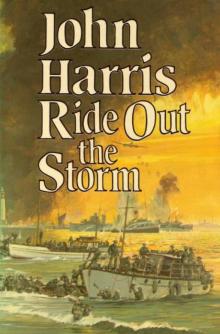 Ride Out The Storm
Ride Out The Storm Corporal Cotton's Little War
Corporal Cotton's Little War Fox from His Lair
Fox from His Lair Paint The Rainbow
Paint The Rainbow Flawed Banner
Flawed Banner Covenant with Death
Covenant with Death So Far From God
So Far From God The Sea Shall Not Have Them
The Sea Shall Not Have Them The Cross of Lazzaro
The Cross of Lazzaro Smiling Willie and the Tiger
Smiling Willie and the Tiger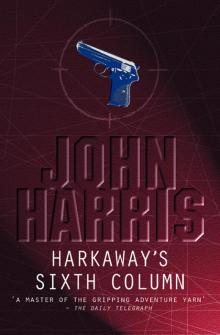 Harkaway's Sixth Column
Harkaway's Sixth Column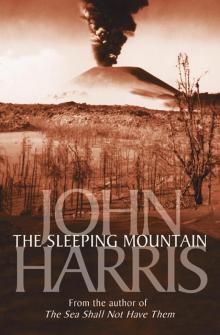 The Sleeping Mountain
The Sleeping Mountain The Claws of Mercy
The Claws of Mercy North Strike
North Strike Picture of Defeat
Picture of Defeat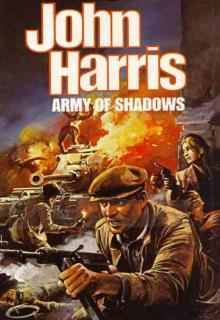 Army of Shadows
Army of Shadows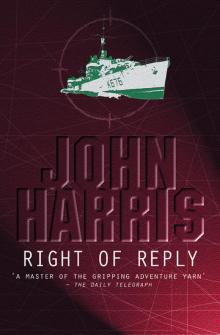 Right of Reply
Right of Reply Getaway
Getaway The Lonely Voyage
The Lonely Voyage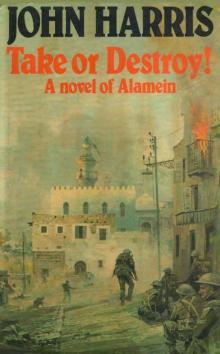 Take or Destroy!
Take or Destroy!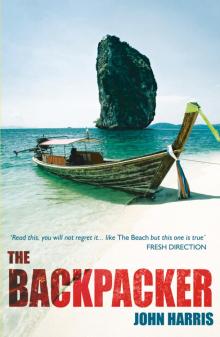 The Backpacker
The Backpacker A Funny Place to Hold a War
A Funny Place to Hold a War Swordpoint (2011)
Swordpoint (2011) A Kind of Courage
A Kind of Courage